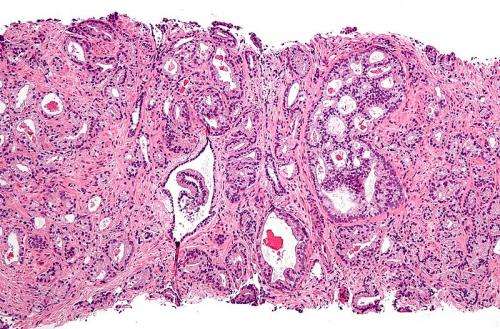New, non-hormonal target identified for advanced prostate cancer

Hormone therapies for prostate cancer have greatly prolonged the lives of patients, but the drugs eventually become ineffective and the disease grows lethal.
Resistance occurs because a small percentage of prostate cancer cells are completely impervious to the therapies, and actually thrive when the drugs are used. Targeting this subset of virulent cancer cells is the focus of a study led by Duke Cancer Institute researchers.
The researchers, publishing online Dec. 4 in Science Translational Medicine, identified a cell surface receptor that is essential for the function and survival of resistant prostate cancer cells, and showed in laboratory studies that this receptor can be targeted to halt tumor growth. A clinical trial is underway using a drug originally intended for lung diseases.
"We noticed in prostate cancer there are two types of cells," said senior author Jiaoti Huang, M.D., Ph.D., chair of Duke's Department of Pathology. "The vast majority are luminal tumor cells, which are susceptible to hormone therapy. But a minor component of cells are neuroendocrine cells, and they are very important. They do not express the androgen receptor, so they will survive hormonal therapy.
"Our hypothesis was that this minor population, because they have the ability to survive, contribute to tumor recurrence," Huang said. "And that's exactly what we found."
Huang and colleagues isolated the neuroendocrine cells from fresh human prostate cancer tissue and studied them in the lab. In early-stage prostate cancer, they constitute no more than 1% of all tumor cells, but their numbers are much larger in late-stage and metastatic disease, and they make up almost all of a particularly lethal form of prostate cancer called small cell neuroendocrine carcinoma.
Current prostate cancer treatments exclusively target the majority population of luminal tumor cells, and they do that job well. But not only do hormone therapies leave neuroendocrine tumor cells untouched, the researchers found, they actually enrich the neuroendocrine cell population.
This occurs because tumor growth is driven by a receptor on the surface of neuroendocrine cells called CXCR2, which creates the optimal environment for prostate tumor cells to proliferate and spread. CXCR2 is also expressed by immune cells and involved in inflammation, and a drug that inhibits its function is being developed for patients with chronic obstructive pulmonary disease (COPD).
Huang's research team tested the drug, navarixin, in laboratory and animal studies, demonstrating that it killed hormone-resistant tumors in combination with enzalutamide, where enzalutamide failed on its own.
"Because CXCR2 is ubiquitously expressed by neuroendocrine cells in prostate cancer of all stages, targeting CXCR2 may particularly benefit patients whose tumors are advanced, recurrent, and resistant to currently available therapies," Huang said.
"The real implications of our findings need to be tested in clinical settings to determine whether patients with advanced prostate cancer benefit from CXCR2 inhibition, alone or in combination with a hormone inhibitor," he said.
More information: Y. Li el al., "Targeting cellular heterogeneity with CXCR2 blockade for the treatment of therapy-resistant prostate cancer," Science Translational Medicine (2019). stm.sciencemag.org/lookup/doi/ … scitranslmed.aax0428



















